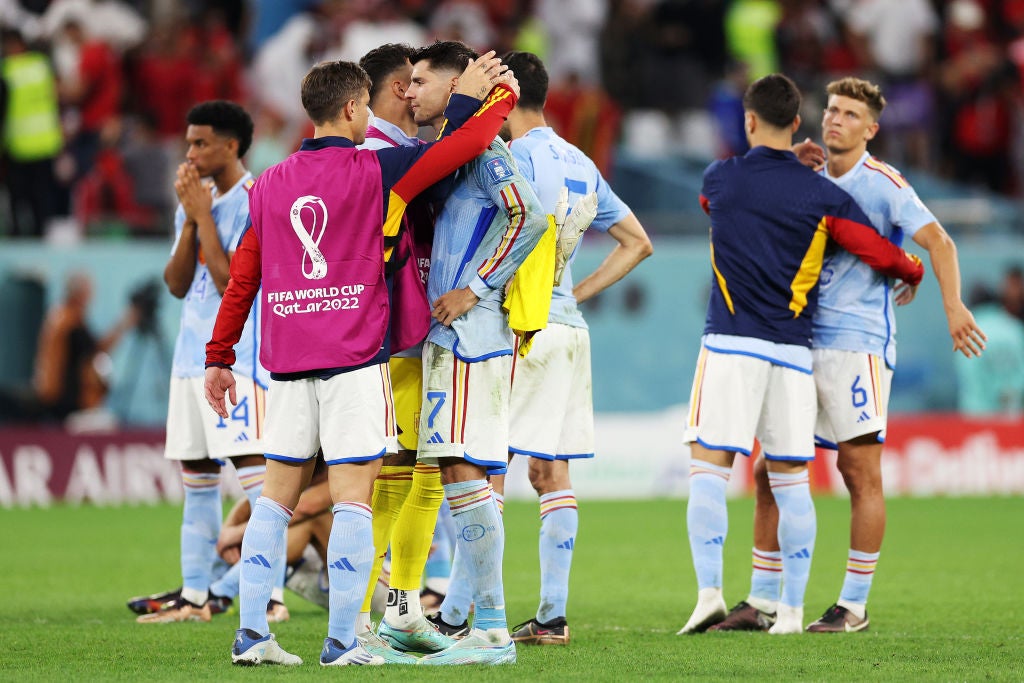Spain’s success inspired a generation of creativity without a clinical edge
Morocco 0-0 Spain (3-0 pens) : Another game in which Luis Enrique’s side dominated possession without finding a breakthrough

Your support helps us to tell the story
From reproductive rights to climate change to Big Tech, The Independent is on the ground when the story is developing. Whether it's investigating the financials of Elon Musk's pro-Trump PAC or producing our latest documentary, 'The A Word', which shines a light on the American women fighting for reproductive rights, we know how important it is to parse out the facts from the messaging.
At such a critical moment in US history, we need reporters on the ground. Your donation allows us to keep sending journalists to speak to both sides of the story.
The Independent is trusted by Americans across the entire political spectrum. And unlike many other quality news outlets, we choose not to lock Americans out of our reporting and analysis with paywalls. We believe quality journalism should be available to everyone, paid for by those who can afford it.
Your support makes all the difference.There is a huge amount to be said for organisation and defensive solidity. It can keep teams up, keep them in a title hunt, level the playing field across 90 minutes when the general gulf in class between teams is enormous.
Positional play, resilience, aggression and minimising spaces between both lines and playing partners have always been hallmarks of what makes for good defensive work.
Somewhere along the way though, it began to change. Attack as the best form of defence became a mantra for some - most notably those who didn’t have the aforementioned traditional traits - and then, with Spain in particular leading the charge, possession as a means of preventing the opposition being able to attack became a prevalent sight.
There are naturally myriad ways of implementing this approach; from the patient and probing short passing, to the higher-risk ball-playing and higher energy reaction to win possession back after losing it. Spain, after winning Euro 2008 with their utter control of the ball and relentless moving around of opposition defences to create spaces, were rightly proud of their ability to dictate play, produce technically gifted players - and replace them with the next generation who played exactly the same way.
From Marcos Senna and Xavi, to Xabi Alonso, Sergio Busquets, right through to the new kids on the block, Gavi and Pedri. And spanning them all just about, the kingpin of excellence and incision, Andres Iniesta. That type of player in the central and attacking thirds - and the expectations on La Roja since that majestic first triumph - have been the constants. The big departure between those first years in particular and now, over a decade later, has been the failure to inspire and produce the players ahead of them: the goalscorers, the match-killers, the front line matador with the clinical touch.
This is not, of course, an entirely new argument. The criticism of them not having that type of finisher, pure scorer, in the lineup has been there for several years.
It is underlined by the fact that there was surprise, or even disappointment, in some quarters when neither Iago Aspas nor Borja Iglesias were in the 26-man squad named by Luis Enrique.
But more than the fact they do not turn to that type of player on a regular basis is the fact they have not been producing them.
Aspas, a Celta Vigo legend, is now aged 35. Iglesias is a mere 29, but could be most generously described as a serviceable forward in goalscoring terms up until the last 18 months or so.
Beyond them in LaLiga this season, Joselu (32) and Alvaro Morata (30, still the squad’s go-to No9) and Sergio Leon (33) are the highest-scoring striker Spaniards. There’s also Alex Baena, Brais Mendez and Inaki Williams around a similar tally of goalscoring, but the first two are not centre-forwards and the latter declared for Ghana.
Young Spanish strikers are not, right now, making their mark. Instead, the youthful call-ups to the squad were Ansu Fati, a wide forward, Yeremy Pino, an all-round second-line attacker and Nico Williams, a winger.
They are all immensely talented. Fati, perhaps, could be seen as the goal guarantee in future, but he remains hugely inexperienced and was struggling with injury for a year. He cannot be the only one they are waiting for as a game-decider.
And boy, are they needed. “Majority of possession” doesn’t begin to describe what they had against Morocco, what they had against Japan. What they have had in so many other matches.

But the end product, too oten, isn’t there when it’s needed most and when it will make the biggest difference.
The major success their playing style gave them has given Spain another generation of Xavis, of Alonsos, even of David Silvas and Pedros, to an extent.
But the lack of a David Villa or Fernando Torres remains glaring.
Morata is the closest they have and for all his traits, he is nowhere near the finisher they were.
It has again cost Spain dearly, and no immediate end to that issue appears in sight.
Join our commenting forum
Join thought-provoking conversations, follow other Independent readers and see their replies
Comments